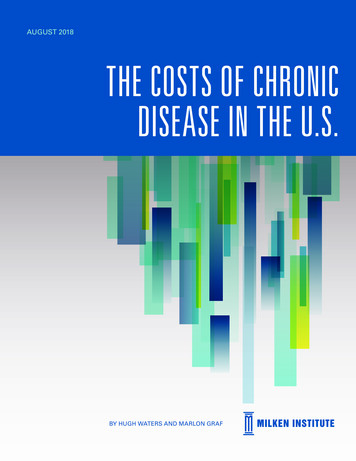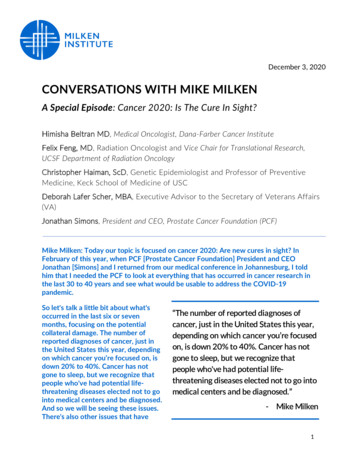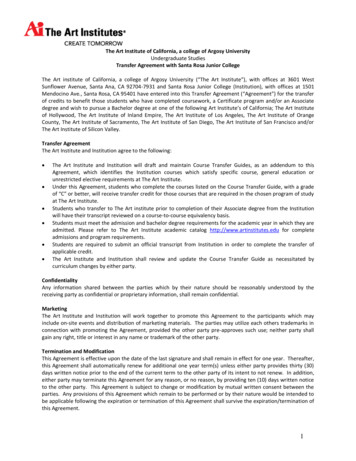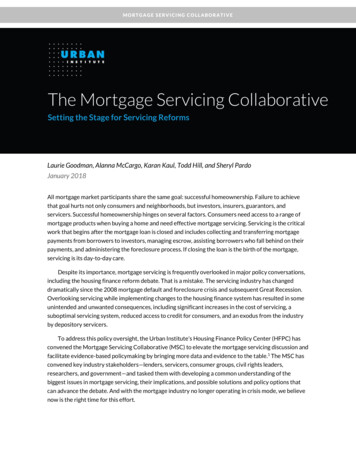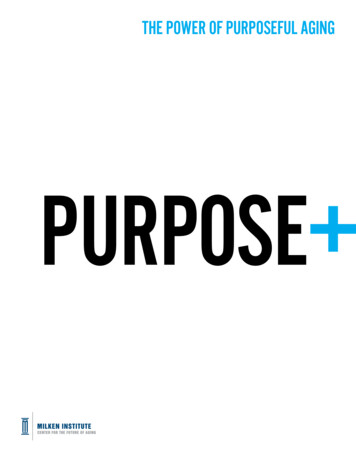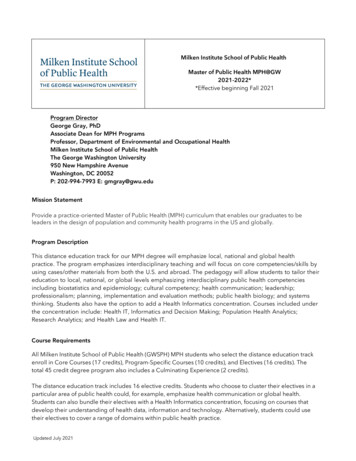
Transcription
Milken Institute School of Public HealthMaster of Public Health MPH@GW2021-2022**Effective beginning Fall 2021Program DirectorGeorge Gray, PhDAssociate Dean for MPH ProgramsProfessor, Department of Environmental and Occupational HealthMilken Institute School of Public HealthThe George Washington University950 New Hampshire AvenueWashington, DC 20052P: 202-994-7993 E: gmgray@gwu.eduMission StatementProvide a practice-oriented Master of Public Health (MPH) curriculum that enables our graduates to beleaders in the design of population and community health programs in the US and globally.Program DescriptionThis distance education track for our MPH degree will emphasize local, national and global healthpractice. The program emphasizes interdisciplinary teaching and will focus on core competencies/skills byusing cases/other materials from both the U.S. and abroad. The pedagogy will allow students to tailor theireducation to local, national, or global levels emphasizing interdisciplinary public health competenciesincluding biostatistics and epidemiology; cultural competency; health communication; leadership;professionalism; planning, implementation and evaluation methods; public health biology; and systemsthinking. Students also have the option to add a Health Informatics concentration. Courses included underthe concentration include: Health IT, Informatics and Decision Making; Population Health Analytics;Research Analytics; and Health Law and Health IT.Course RequirementsAll Milken Institute School of Public Health (GWSPH) MPH students who select the distance education trackenroll in Core Courses (17 credits), Program-Specific Courses (10 credits), and Electives (16 credits). Thetotal 45 credit degree program also includes a Culminating Experience (2 credits).The distance education track includes 16 elective credits. Students who choose to cluster their electives in aparticular area of public health could, for example, emphasize health communication or global health.Students can also bundle their electives with a Health Informatics concentration, focusing on courses thatdevelop their understanding of health data, information and technology. Alternatively, students could usetheir electives to cover a range of domains within public health practice.Updated July 2021
Note that the MPH@GW track will be taught in 10 week quarters throughout the calendar year (4 quarters peryear). Each course will be designed to deliver the required credit hours within the 10 week quarter format, withexisting courses being formatted to meet this requirement.As an accredited School of Public Health, students in all GWSPH MPH programs are also required to fulfill bothan interprofessional team experience and an applied practice experience. GWSPH has incorporated theserequirements into the curriculum as follows:Interprofessional Education (IPE) Experience: Following completion of PUBH 6021 (1-credit) and the MPH Core Classes, students will be required toselect an IPE experience from a host of options provided throughout your enrollment as a MPH studentto participate in a one-time, case-based or activity-based learning experience. The IPE experience is away to experience working with people from other professions/programs outside of public health.Students will have many opportunities to register for this zero-credit (no fee) IPE ‘class’ (PUBH 6023Interprofessional Education Experience) and will receive credit upon successful completion.Applied Practice Experience (Practicum): The applied practice experience allows each student to individually demonstrate attainment of publichealth competencies. Information about the Practicum will be introduced in PUBH 6021 so students maybegin planning for their practice experience. As a part of the content of PUBH 6022 Essentials in PublicHealth Practice & Leadership 2: Managing Organizations & Influencing Systems (1-credit), detailedinformation and an introduction to the necessary tools will be provided. Students are required to fulfillall requirements of the 120 hour Practicum experience to receive credit for this PUBH 6022.Students will begin by taking the core MPH courses. Full-time students should plan to take PUBH 6021 andPUBH 6003 in their first quarter and complete all core courses within the first three quarters. Part-time studentsshould consult with their academic advisor to select an appropriate sequence of courses. Following completionof the core MPH courses, students should complete the MPH@GW program specific courses, and finish withtheir elective selections. Courses offered in the online format can be found on the GW Schedule of Classesunder Online and are designated with a “U” in the section number.The following are examples of electives that are currently offered online. New courses are added frequently.Additional electives may be taken in the residential program provided pre-requisites have been met. The list ofelectives will be updated as new courses become available. PUBH 6054, Community Engagement & Advocacy (2)PUBH 6058, Researching Violence Against Women and Girls (2 credits)PUBH 6128, Global Environmental and Occupational Health (2 credits)PUBH 6132, Water, Sanitation, & Hygiene (WASH) in Low-Income Countries (2 credits)PUBH 6133, Social Dimensions in Climate Change & Change (3 credits)PUBH 6135, Researching Climate Change & Human Health (3 credits)PUBH 6136, Introduction to Environmental and Occupational Epidemiology (3 credits)PUBH 6335, Public Health and Law (3 credits)PUBH 6368, Law, Medicine, and Ethics (3 credits)PUBH 6390, Prescription Drugs, Policy and Public Health (3 credits)Updated July 2021
PUBH 6400, Global Health Frameworks (2 credits)PUBH 6450, Global Health Diplomacy (2 credits)PUBH 6451, Sexual and Reproductive Health Monitoring (2 credits)PUBH 6452, Social and Behavior Change Communication in Middle-to Low-Income Countries (2 credits)PUBH 6455, Global Vaccinology (3 credits)PUBH 6480, Public Health in Humanitarian Settings (2 credits)PUBH 6486, Global Health Programs and Approaches to the Control of Infectious Diseases (2 credits)PUBH 6489, Evaluation of Nutrition Program (1 credit)PUBH 6508, Cost Effectiveness Analysis of Health Promotion Interventions (3 credits)PUBH 6514, Preventing Health Disparities (2 credits)PUBH 6530, Qualitative Methods in Health Promotion (2 credits)PUBH 6552, Women’s Health (2 credits)PUBH 6563, Global Child Health (2 credits)PUBH 6571, Social Marketing (3 credits)PUBH 6572, Marketing and Research for Public Health (3 credits)PUBH 6612, Food Systems in Public Health (2 credits)PUBH 6619, Fundamentals of Nutrition Science (3 credits)Core CompetenciesUpon completion of the program, students should possess the following functional competencies: Apply epidemiological methods to the breadth of settings and situations in public health practiceo 6003Select quantitative and qualitative data collection methods appropriate for a given public health contexto PUBH 6002, PUBH 6003, PUBH 6009Analyze quantitative and qualitative data using biostatistics, informatics, computer-based programmingand software, as appropriateo PUBH 6002, PUBH 6009Interpret results of data analysis for public health research, policy or practiceo PUBH 6002, PUBH 6003, PUBH 6009Compare the organization, structure and function of health care, public health and regulatory systemsacross national and international settingso PUBH 6012Discuss the means by which structural bias, social inequities and racism undermine health and createchallenges to achieving health equity at organizational, community and societal levelso PUBH 6007Assess population needs, assets, and capacities that affect communities' healtho PUBH 6003, PUBH 6007Apply awareness of cultural values and practices to the design or implementation of public healthpolicies or programso PUBH 6007, PUBH 6021, PUBH 6022Design a population-based policy, program, project or interventiono PUBH 6007Explain basic principles and tools of budget and resource managemento PUBH 6022Updated July 2021
Select methods to evaluate public health programso PUBH 6009Discuss multiple dimensions of the policy making process, including the roles of ethics and evidenceo PUBH 6011, PUBH 6012Propose strategies to identify stakeholders and build coalitions and partnerships for influencing publichealth outcomesAdvocate for political, social or economic policies and programs that will improve health in diversepopulationso PUBH 6022Evaluate policies for their impact on public health and health equityo PUBH 6012Apply principles of leadership, governance and management, which include creating a vision,empowering others, fostering collaboration and guiding decision makingo PUBH 6021, PUBH 6022Apply negotiation and mediation skills to address organizational or community challengeso PUBH 6021, PUBH 6022Select communication strategies for different audiences and sectorso PUBH 6021, PUBH 6022Communicate audience-appropriate public health content, both in writing and through oral presentationo PUBH 6012, PUBH 6021, PUBH 6022Describe the importance of cultural competence in communicating public health contento PUBH 6021, PUBH 6022Perform effectively on interprofessional teamso PUBH 6021, PUBH 6023Apply systems thinking tools to a public health issueo PUBH 6007, PUBH 6011, PUBH 6022MPH@GW Program CompetenciesUpon completion of the program, students should possess the following functional competencies: Define communities and identify and assess relevant population health needs (e.g., PubH 6500). Assess the functions, capacities, management and governance of governmental, international andnon-state organizations that comprise health systems. Translate scientific and program evidence toinform the development of public health programs and policies within the context of health systems(e.g., PubH 6442).Apply public health theory and experiential evidence to develop and manage project, program andinstitutional strategies to reduce community and individual health risks to mitigate the impact of disease(e.g., PubH 6503).Apply relevant quantitative tools and concepts to inform different audiences and public health topics(e.g., PubH 6052).Describe how health systems performance is affected by various approaches to health care organization,health law, health workforce development and health care financing (e.g., PubH 6442).Develop communication campaigns and strategies to disseminate health promotion information throughmedia channels (e.g., PubH 6503). Updated July 2021
Milken Institute School of Public HealthMaster of Public Health MPH@GWProgram-at-a-Glance 2019-2020Required Core CoursesCreditsQuarter OfferedPUBH 6002Biostatistical Applications for Public Health3AllPUBH 6003Principles and Practice of Epidemiology3AllPUBH 6007Social and Behavioral Approaches to Public Health2AllPUBH 6009Fundamentals of Program Evaluation2AllPUBH 6011Environmental & Biological Foundations of Public Health3AllPUBH 6012Fundamentals of Health Policy: Public Health and Healthcare2All1All1All0AllPUBH 6021PUBH 6022*PUBH 6023Essentials of Public Health Leadership & Practice 1: Leading Self andTeams in Public HealthEssentials of Public Health Leadership & Practice 2: ManagingOrganizations & Influencing Systems in PHInterprofessional Education Experience (IPE)Total MPH Core CreditsRequired Program Specific Courses17CreditsQuarter OfferedPUBH 6052Practical Data Management and Analysis for Public Health2AllPUBH 6442Comparative Global Health Systems2AllPUBH 6500Planning & Implementation of Health Promotion Programs3AllPUBH 6503Introduction to Public Health Communications and Marketing3AllTotal Program Specific CreditsElectivesAny PUBH 6000level courseMPH@GW electives or on-campus electives where applicableMPH@GW Culminating Experience Courses10CreditsQuarter Offered16Variessee advisorCreditsQuarter OfferedPUBH 6060MPH@GW Culminating Experience I1AllPUBH 6061MPH@GW Culminating Experience II1AllCourse DistributionCreditsPublic Health Core Courses17Culminating Experience2Required Program Specific Courses10Electives16Total Degree Credits45* Note: In PUBH 6021 and PUBH 6022, the Applied Practice Experience (Practicum) will be introduced and guidelines and tools f or fulfillingthis requirement will be provided. Upon completion of the 120 hour required Practicum, students will receive credit for PUBH 6022. MPH@GW students may take up to 15 credits on-campus.Updated July 2021
Graduation RequirementsMPH1. Graduate Credit Requirement: 45 graduate credits are required.2. Course Requirements: Successful completion of the core courses and the program-specific courses arerequired.3. Practicum Requirements: Students are required to fulfill all requirements of the Applied Practice Experience(Practicum) to receive credit for PUBH 6022.4. Interprofessional Education Experience (IPE): Students are required to enroll, participate and complete anauthorized IPE activity (PUBH 6023).5. Grade Point Requirement: A 3.0 (B average) overall grade point average is required.6. Time Limit Requirement: The degree must be completed within five years.7. Transfer Credit Policy: Up to 12 graduate credits that have not been applied to a previous graduate degreemay be transferred to the MPH upon approval. Credits must have been earned from an accredited institutionin the last 3 years with a grade of B or better (grade point of 3.0 and higher).8. CITI Training requirement: All students are required to complete training regarding human subjectprotection regulation and the Health Insurance Portability and Accountability Act of 1996 (HIPAA). To fulfillthis requirement, you must complete the Collaborative IRB Training Initiative (CITI) Course in The Protectionof Human Research Subjects.9. Integrity Quiz & Plagiarism requirement: All students are required to review the George WashingtonUniversity Code of Academic Integrity and take the quiz within their first semester of study. The Code ofIntegrity and step-by-step instructions can be found here: http://publichealth.gwu.edu/integrity.10. Professional Enhancement requirement: Students must participate in 8 hours per degree program of PublicHealth-related lectures, seminars, and symposia related to your field of study. Professional Enhancementactivities supplement the academic curriculum and help prepare students to participate actively in theprofessional community. Opportunities for professional enhancement are regularly publicized via the MilkenInstitute SPH Listserv and through your department or advisor. Students must submit documentation ofProfessional Enhancement activities to the Office of Student Records. Find the Professional Enhancementsubmission form here and include a description of the program agenda and proof of attendance.Course Descriptions and Registration information can be found on in the University Bulletin here.Updated July 2021
MPH@GW students may take up to 15 credits on-campus. Updated July 2021. Milken Institute School of Public Health Master of Public Health MPH@GW Program-at-a-Glance 2019-2020 . Required Core Courses Credits Quarter Offered . PUBH 6002 Biostatistical Applications for Public Health 3 All PUBH 6003 Principles and Practice of Epidemiology 3 All

